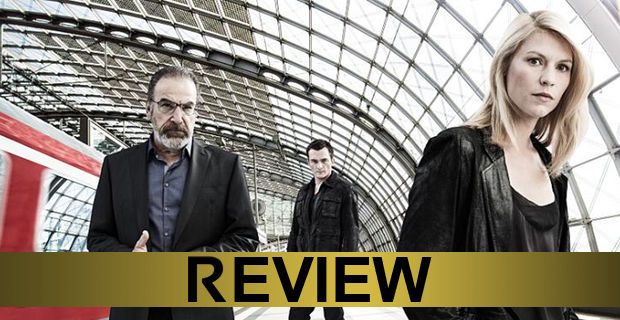[This is a review of Homeland season 5. There will be SPOILERS.]
-
For the better part of three seasons now, Showtime's Emmy-winning series Homeland has been working in deep cover, pretending to be something it's not. The longer it was out in the field, attempting to pass itself off as a romance between an American soldier who became a terrorist sleeper agent and the CIA agent battling mental illness (and the aftermath of that romance), the more the burden of maintaining such a ruse began to show.
In the wake of its phenomenal first season, Homeland was met with an incredible challenge: to continue with a short-term formula that brought it great success, or to tell a new story, one that made the best of assets like Carrie and Saul, pitting them against other threats in the intelligence community. To be fair, option number two was never really and option. The moment the bomb strapped to Sgt. Brody's chest didn't detonate, killing the vice president and everyone else in that bunker in the process, the fate of Homeland was ostensibly sealed. What could simply have been an amazingly tense 12-episode series was now in the position of maintaining an almost impossible level of tension.
From that moment forward Homeland headed toward a world of diminishing returns; it could stay in deep cover for only so long before the jig was up. The rock-bottom crash of season 3 was the likely turning point, and though season 4 fiddled with the idea of re-jiggering its premise just so, it wasn't until season 5 that Homeland chose to embrace its inner spy and to become the series it should have become in season 2.
Blending a Law & Order-esque ripped-from-the-headlines approach with a heavy and very welcome dose of John le Carré, Homeland's fifth season positioned its spy series bona fides front and center. At times the series felt wholly new and reinvigorated, while at others it proved a certain spot-changing idiom to be true. Deep cover identities have nuggets of truth sprinkled about them to keep the drain of maintaining a false front from becoming too great. There are fixed aspects of a television series, too; indelible peculiarities so deeply ingrained in its genetic makeup, hiding them is nearly as impossible as extricating them. Episodes like 'Super Powers,' then, are Homeland's way of confirming its identity.
Positioning Carrie's mental illness in such a way, as something like the spy-series equivalent of being bitten by a radioactive spider, was a new low that also kicked the season's plot into high gear. Carrie may have demonstrated her sharpshooting skills by nearly picking off Quinn in the woods, but Homeland was shooting from the hip. The blunderbuss-like shot sent the season off into some unexpected places, many of which resulted in the best story lines these characters have seen in quite some time.
After season 4 sidelined Saul, making you long for the days when Mandy Patinkin was spreading peanut butter on a cracker with a ruler he'd found in a desk, season 5 proved it understood how essential the character is to the overall success of the show. Patinkin's grounding presence normally kept the series' self-indulgent unmooring of Carrie's psyche from getting lost at sea. Now that the writers have wisely chosen to play down the threat of her psychological unspooling, Saul is no longer anchored to the role of minder. Instead, he was braving the choppy waters of the season's most thrilling plot: the discovery of Miranda Otto's double agent, Allison Carr.
Quinn, too, saw the benefit of the series' foray into more mature spycraft. The inherited trait of the genes Homeland shares with 24, the seasoned wetwork artisan always felt like an outlier on the series. Despite an always-engaging performance from Rupert Friend, Quinn felt like more of a get-out-of-a-dull-plot free card than an actual character. His would-be romance with Carrie last season also proved he wasn't much of a stand-in for Brody either. So what do you do with a guy who by all accounts should be an essential part of the series yet never truly reached his potential? You make him the living embodiment of the fate that awaits Carrie if she makes certain choices.
Choices are important in 'A False Glimmer,' and not just because Carrie is met with two that will shape her future in wildly different ways, but also because Homeland made an interesting choice with regard to the way its season finale played out. More introspective than most Homeland finales, the episode wrapped up the sarin-gas attack plotline in the first few minutes, calling on Qasim (Alireza Bayram) to help Carrie put an end to the attack before the episode even hit the five-minute mark.
It's a bold choice for a series that made its name off riding great tension for hours on end. Carrie's presence in the tunnels makes it clear the attack will never come to fruition, so it is just a matter of watching the events play out. There's not much tension, but it doesn't really matter. Defusing the bomb that early leaves the finale with the better part of an hour to dive into its other plot threads, which it does by splashing around the gray areas between government transparency and the shadier world of international intelligence and the war on terror. Homeland doesn't presuppose it has an answer to either. Intrepid journalist Laura Sutton's story ends with dismal compromise at the hands of the fantastic Nina Hoss. Instead the finale uses those aforementioned questions to frame the choices Carrie is met with by the season's end: accept Otto's proposal of a life partner (that will almost certainly come with unforeseen complications) or go back to the CIA with Saul – a move that has complications written all over it.
Everything that transpires during the hour informs the weight of Carrie's decision. At a certain point, it boils down to the knowledge that Carrie is caught in an endlessly repetitive loop, one that will seemingly only end when she crashes on the same "rocks" Quinn ran aground on. That gives significance to Quinn's arc, transforming his situation into a portentous message for Carrie, lest she share his fate. It's obviousness doesn't completely undermine its poignancy, and it affords Quinn a graceful exit – even though the episode comes to a close without definitively bringing Quinn's story to one.
'A False Glimmer' is anything but when it comes to proving the ongoing maturation of Homeland. The show is still what it is – prone to preposterous leaps, like Otto's proposal to Carrie and the revelation that he poisoned Jonas' opinion of her in order to have her for himself – but it managed to keep a level head for most of the season. That levelheadedness made for compelling intrigue within a welcome slow-burn story line that, like Carrie, recognized it could find success in changing the way it approached its own narrative. Like pulling a deep cover operative from the hot zone, though, this version of Homeland feels less like the show trying to convince others of what it is, and more like it is finally comfortable in its own skin. Let's hope season 6 provides more of the same.
-
Homeland will return for season 6 in 2016 on Showtime.




